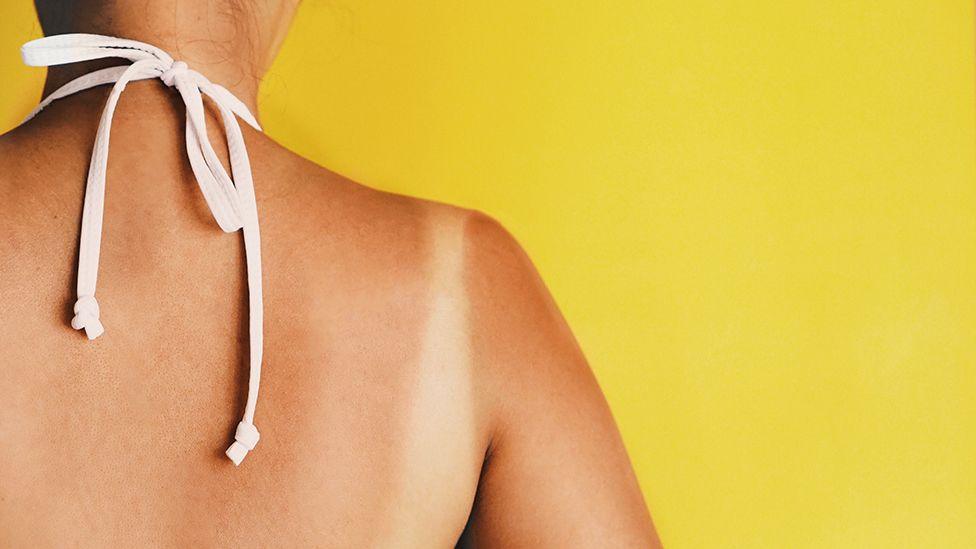Mum noticed my wrinkles at 23 - now she regularly gives me botox
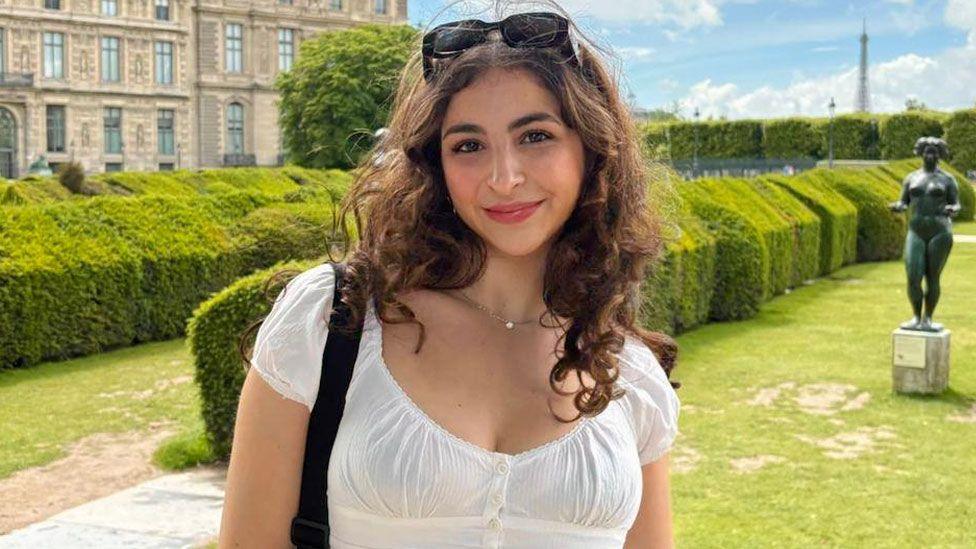
Sydney Brown says she and her friends will do "whatever it takes" to look their best and feel confident
- Published
It was Sydney Brown's mother who first noticed her frown line. A couple of years ago, the pair were video calling when her mum pointed out a crease between her daughter's eyebrows.
They decided it was the right time for Sydney, then 23, to start having anti-wrinkle injections.
Now 25, Sydney has had both botox and lip filler. She is happy with her decision, and says she and her friends will do "whatever it takes" to feel more confident and "look their best". If that comes in the shape of cosmetic surgery - so be it.
Sydney's mum, Dr Hayley Brown, an award-winning plastic surgeon based in Las Vegas, regularly injects small amounts of botox into her daughter's forehead.
She says her daughter looks less tired, feels more confident and, Dr Brown believes, won't need more invasive surgery to smooth out deeper lines later in life.
Using anti-wrinkle injections in the way Sydney does is known as "preventative botox". Botox users in their 20s and early 30s hope to prevent lines forming in the first place, or to target a crease before it becomes a wrinkle.
The ageing process is inevitable, but are preventative cosmetic treatments a savvy way of holding on to our youth? Or are we just injecting thousands of pounds into an industry that's profiting from our insecurities?
I have spoken to both users and experts in the hope of finding an answer.

Dr Hayley Brown believes using botox as a wrinkle prevention saves people from having more invasive surgery later on
The less you contract your muscle, the less your skin creases, reducing the appearance of wrinkles. But what was once reserved for the ageing wealthy, or the elusive world of celebrities, has now reached the foreheads of 20-somethings across the UK.
Around 900,000 botox injections, external are carried out in the UK every year. Worldwide, the percentage of 18 to 34-year-olds opting for cosmetic tweaks is growing, making up nearly a quarter of the clientele. , external
In a brightly lit clinic in Prestwich, north Manchester, Dr Javed Hussain, a doctor and medical director of his company, Neo Derm, is preparing to treat his next client, 26-year-old Ven Grecu, who has been coming for botox for the past two years.
He listens intently as Ven explains where he wants his treatment. When his client lifts his eyebrows up, his skin creases as he points at various areas.
Poised with the needle, Dr Hussain warns: "You will feel a short, sharp scratch…. there we go, over in seconds."
Ven barely flinches.
With a slightly reddened forehead, Ven turns his head to speak to me.
"I know I'm young," he says, "But it's not an age factor. I'm having this as a way of preventing wrinkles.
"Not having them makes me feel so confident, it helps me in my job, and I want to age gracefully."
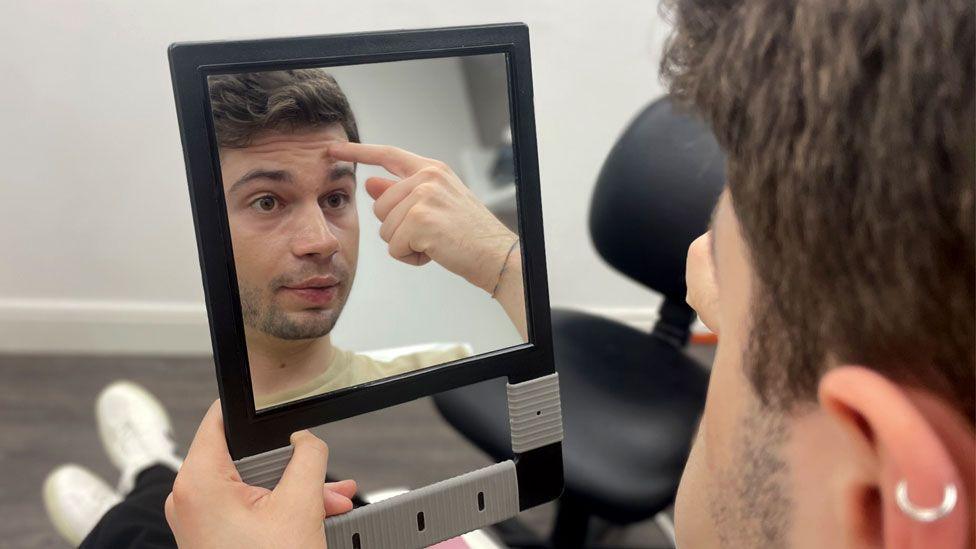
Ven Grecu has been having botox injections since he was 24, he says he wants to "age gracefully"
So far, Ven, a business development manager who also works for Neo Derm, has spent thousands of pounds on treatment, but "it's an investment in my confidence and it's worth every penny", he says.
But if a wrinkle isn't yet there, then how does having botulinum toxin injected into your face impede the ageing process?
"It doesn't stop you from ageing," Dr Hussain explains, "but it does slow down its progress".
Dr Hussain says that, by targeting the dynamic wrinkles – the temporary creases we create when we make a facial expression – static lines are reduced in the long run.
"By relaxing the muscles that contract, we are reducing the number of times the skin wrinkles.
"That, in turn, prevents the lines from getting so deep."
The practitioner says he is seeing an increase in the number of 18 and 19-year-olds coming in for treatment and, despite it being legal to inject anyone over the age of 18, he does turn them away.
"I've had some girls come in asking for botox and lip fillers - some asking for 3 or 4ml in their lips, which is a lot, especially if they haven't had any treatment before."
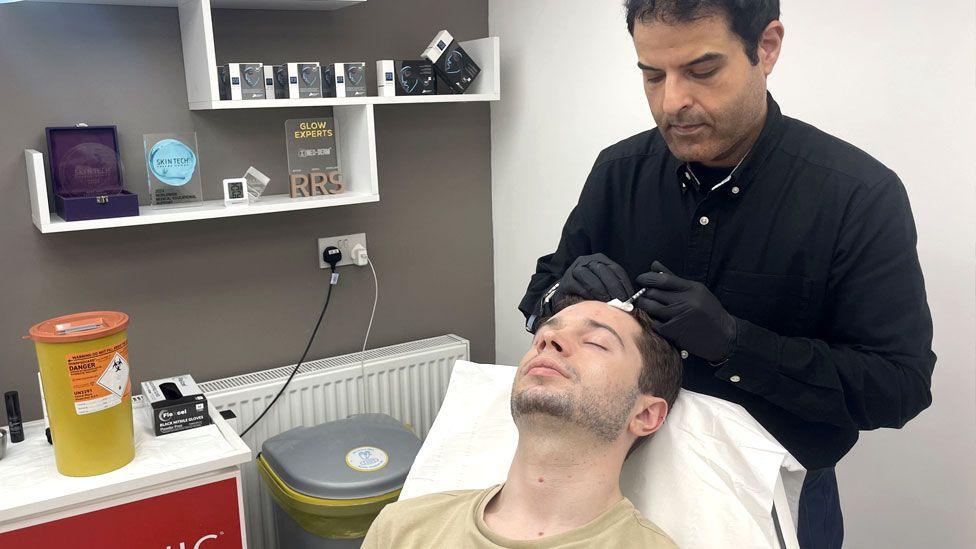
Dr Javed Hussain will treat young people like Ven but only if they can give fully informed consent and are doing it for the right reasons
Not everyone agrees with Dr Hussain that preventative botox is an effective way of preventing signs of ageing.
Nora Nugent, consultant plastic surgeon and President of the British Association of Aesthetic Plastic Surgeons (BAAPS), does not recommend getting botox at such a young age, and says starting too early is a waste of money.
"You can't treat something that isn't there. Having it in your early 20s, with barely anything to treat, is spending a lot of money before you reap any benefit."
She prefers to see clients when they already have faint lines – by then, she can see the nuances of how a face is ageing so she can adapt her treatment.
"There's nothing wrong with caring about your appearance or having aesthetic procedures, but it's important to have them for the right reason.
"It can almost become peer pressure – aesthetics is about choice and doing things that make you feel better about yourself rather than being pressured into doing it."
It's this pressure that worries specialists such as Jen Tomei, a nutritional and eating disorder therapist, who gives talks in schools about body image.
"As a society, we are obsessed with anti-ageing. There is an increased awareness of procedures like botox and fillers among teenage students."
She says she is worried about their mental health in the long run, and as part of her lessons she tries to get them to focus on other positive things about themselves, rather than just their appearance.
"They shouldn't be thinking about wrinkles now."
'Build up a tolerance'
Ashton Collins, director of Save Face, an organisation which campaigns for better regulation of the cosmetic industry, says she has seen patients as young as 18 with botox related complications after being treated by "unscrupulous practitioners".
"I'm very concerned about how preventative botox is being marketed, particularly posts on social media that target and pressure young women into treatments they do not need."
She also warns that by having botox too early, and, if it's not carried out carefully, inappropriate treatment over a long period of time can cause altered expressions, an asymmetrical face and in some cases longer term muscle atrophy which can take years to recover from.
She says that having botulinum toxin injected at such an early age risks building up a tolerance to it. She started when she was 26 and, now 37, needs it more frequently than ever as it wears off so quickly.
There are a range of views when it comes to the preventative power of botox, but all the experts are in agreement that cleansing, moisturising and daily use of sunscreen can help prevent our skin from ageing prematurely. And if you are going to use treatments like botox - find a practitioner who is accredited with a medical background.

Sydney (right) completely trusts her mum, Dr Hayley Brown (left) to keep her looking natural
As for what happens if you use botox regularly across a whole lifetime, we still don't have good research.
Finding a cohort of people to study over the course of several decades is tricky. The healthiness of skin is multi factorial – lifestyle, environment, stress levels, diet and exercise regime all play into how our skin ages. And, given that botox only lasts three to six months, any longitudinal study would have to ensure participants are going for regular top-ups.
And that's the crux, fighting the wrinkle is a war of attrition. Once you've had one treatment, because it wears off after just a few months, you have to keep going back for more.
Sydney will continue to have anti-wrinkle injections. She completely trusts her mum to keep her looking young and, most importantly, natural.
She says her mum will stop her from having too much and failing to recognise her own face changing by going "botox blind" or "filler blind".
"I only have a little bit, I will definitely continue. It's super easy to get it, my mum knows what she is doing and I feel so much more confident having it."
Related topics
More weekend stories
- Published10 August
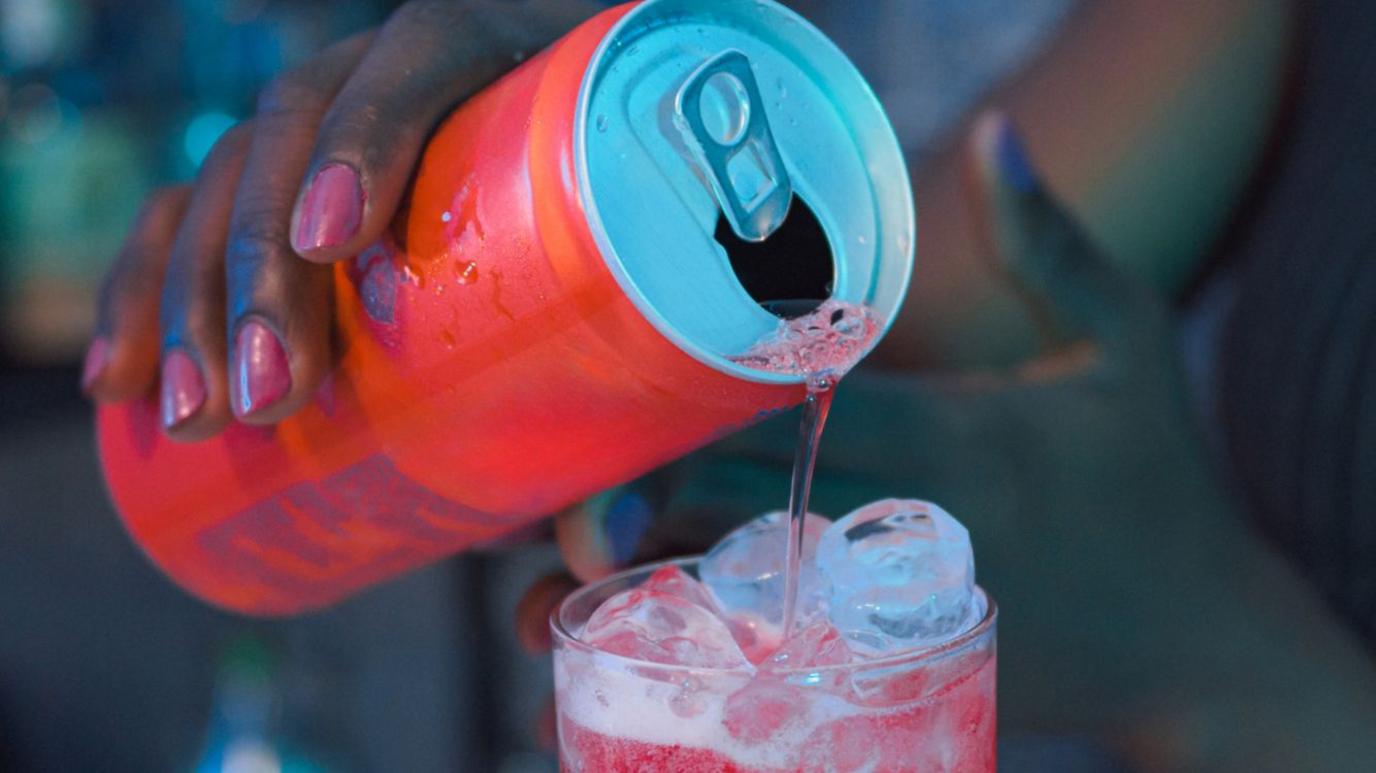
- Published22 June

